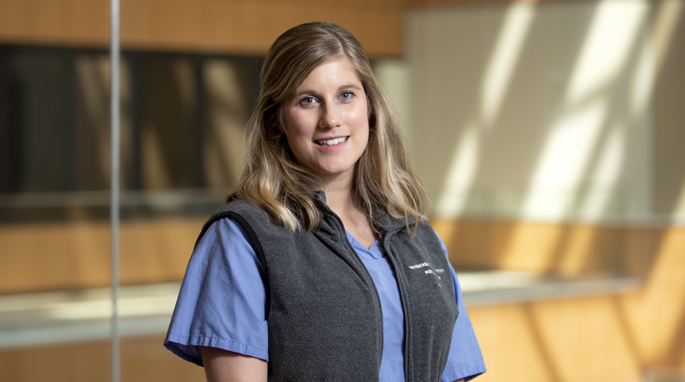
by Bill Snyder
A year into the pandemic, Rebecca Plowman, RN, realized that all her patients with COVID-19 had died within a month of being admitted to the Medical Intensive Care Unit (MICU) at Vanderbilt University Medical Center.
“It was all deceased, deceased, deceased,” she shared during this month’s “Bedside Matters,” an online forum for front-line VUMC health care providers. Despondent and overwhelmed by a profound anxiety that plagued her day and night, Plowman began to ask herself, “What am I even doing here?”
For hospital chaplain Sherry Perry, MDiv, BCC, a low point came when she had to tell the wife of a patient dying from COVID-19 that, to protect her and her family from infection, she could not go into his room to embrace him at the end of his life.
“She’s tearfully begging to go into the room,” Perry recalled. “That was gut-wrenching … It felt very harmful to this family.”
This was before vaccines became available, before clinicians knew whether personal protective equipment (PPEs)—masks, gowns, and gloves—would prevent person-to-person transmission of the COVID-19 virus. The fear and uncertainty were real. Under these circumstances, it made sense to restrict family visits.
Yet, many caregivers were traumatized by the experience. The experts call it “moral injury,” the drive to care for one’s patients upended by the terror of an invisible but very deadly microbial enemy.
“I think it was anti-medicine what we did,” said E. Wesley Ely, MD, MPH, a critical care lung specialist and Grant W. Liddle Professor of Medicine who moderated the panel discussion. “We had our reasons, but I don’t ever want to see us do it again. We know that PPE works now, (and) we have vaccinations.”
The hour-long discussion, which was attended online by more than 80 people, was entitled, “Using humanism and science to reclaim what COVID took in medicine.”
“Each person in the world, I believe, is of inestimable worth,” Ely explained. “No amount of disease, lack of money or lack of education reduces a human’s value or worth. Humanism is acknowledging that, and lifting each other up, based on the mere fact that we are all equal.”
The pandemic put that lesson to the test, however. It exposed social disparities that marginalize portions of the population—here and around the world.
“A lot of things were unmasked with COVID. Underserved populations were hit harder than others,” said Robert Miller, MD, the Patricia and Rodes Hart Professor of Medicine and co-medical director of the medical student-run Shade Tree Clinic.
“As a society we became more polarized,” Miller said. “We had a lot of things that became unmasked, like the need for more child care. I’m afraid that as we’ve gotten away from the pandemic, we’re walking away from a lot of that as a community.”
“As bad as it was in the States, it was worse in a lot of other places,” noted John Tarpley, MD, professor emeritus of Surgery who with his wife, Maggie, spent the first two years of the pandemic providing medical services in Botswana.
The pandemic “exposed the fragility of health care systems throughout much of sub-Saharan Africa,” he continued. PPE was unavailable and vaccines didn’t arrive for months after wealthier countries had received them. “We experienced PPE apartheid and vaccination apartheid,” he said.
Even after the pandemic subsided, many nurses and other front-line caregivers continued to struggle with the trauma they had experienced, said Enqu Kent, RN, clinical staff leader of the MICU.
So how can they reclaim what COVID-19 took away from them?
For Plowman, healing came from sharing with her doctor and friends.
“I started talking to people,” she said. “I started processing this grief that I had been feeling for two years but not dealt with. Once I started working through that grief, I was able to recognize that the work that I do still had meaning.”
“This experience is always going to part of us,” Perry added. “It’s part of who we are now. We have to reintegrate that experience into our new selves and move forward.”
One way to do that, Perry said, is through Touchstone, a practice of affirmation introduced by the Spiritual and Pastoral Care department several years ago.
“We are still valuable. We still give great care. Through the pandemic, we did the best with what we had … We need to make that part of who we are going forward,” she said.
“Given the cards that we were dealt, I think folks rose to the occasion,” Tarpley added. “I think we should celebrate that.”
Walter Merrill, MD, professor of Cardiac Surgery who organizes the Bedside Matters forums, agreed. “It reminds us,” he said, “of the better angels of our nature.”